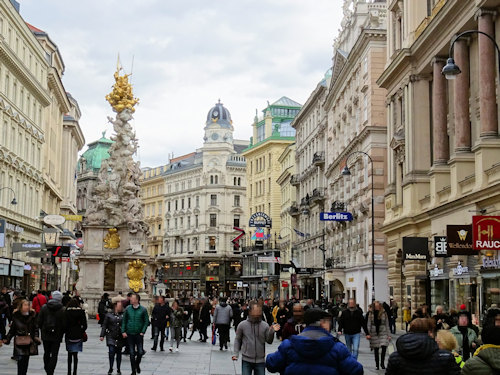
Vienna is surprisingly safe for a city with over two million inhabitants.
This perhaps reflects the country at large: the 2023 Global Peace Index, for example, ranked Austria as the fifth most peaceful country in the world, just behind New Zealand and ahead of such countries as Singapore, Japan and Switzerland.
- City regularly tops international liveability rankings
- See also:
High rankings, low crime

(Vienna hit 2 million inhabitants in late 2023. Add in visitors and commuters and some areas can get very busy. As in every big city: watch your bags)
Obviously every city has its exceptions. Regarding any potential security issues, for example, consult your embassy or consulate for specific advice.
But on a day-to-day basis, Vienna enjoys a strong reputation when it comes to crime and safety. Here some official stats on annual trends for those who like numbers:
- Reported crime in Vienna dropped over 10% to a 19-year low in 2018 with a subsequent slight 2.6% rise in 2019.
- Numbers then fell by 12.2% in 2020 and a further 5.4% in 2021 to another long-term low. (Although, to be fair, we had significant periods in lockdown, for example, and far fewer travelers and visitors.)
- Reported crime then began to “return to normal” in 2022, rising 16.7% compared to 2021. And again in 2023, rising a further 10.8% compared to 2022.
- That left reported crime across 2023 at just over 9% lower than in the worst year (2016) of the last ten
I’ve lived here around 30 years and the only time I felt personally threatened was when a rather dishevelled-looking man approached me on an empty tram and pulled what I thought was a knife from his jacket.
It wasn’t a knife (yeah, I wasn’t wearing my glasses). He was actually an undercover ticket inspector pulling out his ID. For the record, I had a valid travel pass.
More evidence for Vienna’s safety comes indirectly from its regular high rankings in global quality of life surveys. For example…
- Vienna topped the 2023 Quality of Living rankings produced by Mercer for the eleventh time in a row.
The 2019 Mercer report included a separate ranking for personal safety, where Vienna placed sixth in the world, one spot below Zurich.
- The Economist Intelligence Unit ranked Vienna first in the 2023 Global Liveability index. The city came top in the 2022, 2019 and 2018 reports, too. Regarding the latter, the survey’s editor was quoted as saying, “It’s proven to be one of the safest cities in Europe.”
Vienna had dropped to 12th in the EIU’s 2021 ranking thanks to the COVID situation in Europe!
- Monocle magazine also ranked Vienna first in its 2023 Quality of Life Survey.
..but still some crime
Despite all that good news, you should still take the same care you would when travelling to any large European city, particularly as regards parks, waterways and around transport facilities late at night.
Crime in Vienna is generally low, but there is still crime. Pickpockets, for example, may be about in busy areas (particularly during the Christmas markets) and on packed trams and trains.
As mentioned earlier, do consult your embassy or consulate for specific advice, especially in the context of any potential security incidents. For example, see the security and safety advice for Austria provided by the US State Department, Australian Government and the UK Government.